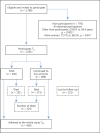Predictors for Nursing Home Admission and Death among Community-Dwelling People 70 Years and Older Who Receive Domiciliary Care
- PMID: 26483831
- PMCID: PMC4608662
- DOI: 10.1159/000437382
Predictors for Nursing Home Admission and Death among Community-Dwelling People 70 Years and Older Who Receive Domiciliary Care
Erratum in
-
Erratum.Dement Geriatr Cogn Dis Extra. 2015 Oct 13;5(3):386. doi: 10.1159/000441045. eCollection 2015 Sep-Dec. Dement Geriatr Cogn Dis Extra. 2015. PMID: 26628896 Free PMC article.
Abstract
Aim: The aim of this study was to analyze which variables predicted nursing home admission (NHA) and death.
Methods: 1,001 recipients of domiciliary care were assessed three times in a 3-year period. Through bivariate and multivariate Cox proportional hazards regression models, associations between a covariate and the outcomes were analyzed.
Results: Participants with dementia had a higher risk of NHA (odds ratio 3.88, 95% confidence interval 2.92-5.16) compared to participants without dementia. The Neuropsychiatric Inventory sub-syndrome psychosis, poorer functional impairment and age were associated with NHA. Female sex, age, worse medical health and functional impairment were associated with death.
Conclusion: Support to the caregiver and education on how to meet and cope with behavioral disturbance, depressive mood and sub-syndrome psychosis will probably enable the family to better adapt to late life changes.
Keywords: Community-dwelling; Dementia; Domiciliary care; Neuropsychiatric syndrome; Older people.
Figures
References
-
- Luck T, Luppa M, Weber S, Matschinger H, Glaesmer H, Konig HH, Angermeyer MC, Riedel-Heller SG. Time until institutionalization in incident dementia cases – results of the Leipzig Longitudinal Study of the Aged (LEILA 75+) Neuroepidemiology. 2008;31:100–108. - PubMed
-
- Agüero-Torres H, von Strauss E, Viitanen M, Winblad B, Fratiglioni L. Institutionalization in the elderly: the role of chronic diseases and dementia. Cross-sectional and longitudinal data from a population-based study. J Clin Epidemiol. 2001;54:795–801. - PubMed
-
- Luppa M, Luck T, Brähler E, König HH, Riedel-Heller SG. Prediction of institutionalisation in dementia. A systematic review. Dement Geriatr Cogn Disord. 2008;26:65–78. - PubMed
-
- Hebert R, Dubois MF, Wolfson C, Chambers L, Cohen C. Factors associated with long-term institutionalization of older people with dementia: data from the Canadian Study of Health and Aging. J Gerontol A Biol Sci Med Sci. 2001;56:M693–M699. - PubMed
-
- Dramé M, Lang PO, Jolly D, Narbey D, Mahmoudi R, Lanièce I, Somme D, Gauvain JB, Heitz D, Voisin T, de Wazières B, Gonthier R, Ankri J, Saint-Jean O, Jeandel C, Couturier P, Blanchard F, Novella JL. Nursing home admission in elderly subjects with dementia: predictive factors and future challenges. J Am Med Dir Assoc. 2012;13:83.e17–83.e20. - PubMed
LinkOut - more resources
Full Text Sources
Other Literature Sources



